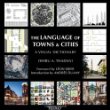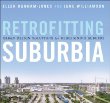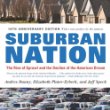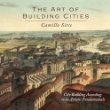After looking over his extensive library of books on urbanism, Brent Toderian selects the 100 best books on city-making that he's collected and read over the years.

I usually don't associate happiness with things, "stuff," material goods, but I have to admit that there are few things that make me happier than my books. Ever since I was a kid, I've loved libraries and book stores, and when I saw that a childhood friend's home had a room full of floor-to-ceiling book shelves, I knew that one day I would have to have a room like that. It's unlikely that I'll ever embrace the growing trend of downloading books on tablets - for me, there's simply nothing quite like sitting in my “library” (the enclosed balcony in our downtown apartment), surrounded by my favourite books on city-making.
I like to claim that I have the most extensive library of books on urbanism of any city-making practitioner - at least for any non-professor! If anyone would care to challenge my possible self-delusion, bring it on!
Back in the early 2000's when I was Plan Canada's contributing editor for book reviews, I wrote a piece on the 10 most important urban design books ever written. It was in the days before such articles would end up online, so I haven’t been able to find it - at least not without digging through boxes in storage that I haven't touched in years.
I remember that the list included some of the more obvious greats like Jacobs (both of them, Jane & Allan), Whyte, Alexander, Unwin, Cullen, and others that may or may not still be in print - I wish I could remember all 10. Even if I could, would I pick exactly the same 10 today? I doubt it, since the books out there, and I, have changed a lot since then.
Regardless, with so many more books on the shelves now than I had 12 years ago, why would I stop at the top 10? Why not the top 100? In fact, it would be tough to pick just 100!
So, in looking over my bookshelves tonight, here are 100 of my favourite books on city-making that I’ve collected and read over the years. Many are quite old, but still completely relevant. Others are only a decade or two old, but may not as relevant as they once were... but they are included because they were very meaningful and valuable to me at the time I read them.
Many are possibly not in print anymore, but are worth keeping an eye out for, particularly in used bookstores (that may be where I myself bought them – my favorite place to buy books on urbanism used to be used/antiquarian bookstores). I still remember the days I found my cherished copies of Camillo Sitte's "The Art of Building Cities" (1945) and Charles Mulford Robinson's "Modern Civic Art, or The City Made Beautiful" (1909) in their respective stores. But don't worry, if you don't love the classics like I do, I’ve bolded the relatively newer books in the list, to help you focus on more recent publications. While I was at it, I’ve italicized the books that I think were written to be particularly readable and entertaining to the non city-making professional – something I think more books should strive to achieve.
Some books on this list I actually disagree with - maybe they’ve been part of the problem, or part of the failing of city-building since the mid-20th century. Regardless, I still enjoyed reading them because they made me think or challenged my assumptions. Other classic books in my library that I disagree with, like those written by Le Corbusier & Frank Lloyd Wright (who had terrible ideas about, and effects on, cities), I just couldn't bring myself to include, even though I considered it important to read them for educational reasons.
Are these books really the "best" books in my library? I confess, I deliberately misled you in the title of this post because I thought it sounded like a better title than "100 favourite books." "Best" is a term I don't usually use, as it is highly subjective. Really, is there a “better” book than Jacobs’ “Death and Life?” Likely not, but I’ve put two others ahead of it, as they had just a bit more of a unique influence on me, likely in part because the authors have become both mentors and friends. So don't expect this list to be “scientific” – it’s highly emotional, and personal. These may not be the best in my library, but I can say that at this particular moment in time, they are my favourites.
Lastly, don't take the specific ranking too seriously – I didn't really agonize over whether I liked a particular book 22nd, 24th, or 30th. But it’s close enough for you to get the picture.
So here goes, from last to first.
Before I wrap this up, in addition to the 100 professional or pseudo-professional books above, I thought I’d add a few honourable mentions… unusual books that have influenced how I see city-making, but not really books specifically about city-making.
Honourable Mentions:
- Oh, the Places You'll Go! – Dr. Seuss (That's right! Dr. Seuss understood placemaking!)
- The Fountainhead – Ayn Rand
- The City and the City – China Mieville
- Invisible Cities - Italo Calvino
- The Devil in the White City – Erik Larson
- The Tipping Point, & Blink – both by Malcolm Gladwell
These books may not be your favourites, and if so, I’d love to hear why. Would you include other books on the list? Are there books on mine that you disagree with or dislike? Do you disagree with the order? I look forward to the discussion and debate.
Postscript
In the 4 days since posting, the discussion and debate about my choices on this list have been vigorous, interesting, and fun – the response has been remarkable! The Planetizen commenters listed below reflect only a small portion of that, adding to the many tweets and emails I’ve received.
With the benefit of hindsight and this great discussion, here are a few additional thoughts on the Top 100:
As a result of persuasive lobbying (and not from the authors), I agree that three books should probably have been moved up on the list – Duany/Plater-Zyberk/Speck’s Suburban Nation, Kunstler’s The Geography of Nowhere, and McHarg’s Design With Nature. I won’t say how far up I would move them, and I suspect it wouldn't be as much as their supporters might like, but their complex contribution warrants a different and more complementary number. For those of you who might suspect that I’m capitulating to pressure, you should know that many other books were also argued for – the difference in the case of these three books, is that I agreed with the arguments.
I would also add four books to the list that were definite oversights:
- Jacobs’ The Economy of Cities, which in some ways influenced me more than the included Cities and The Wealth of Nations;
- Douglas Kelbaugh’s Common Place: Toward Neighborhood & Regional Design;
- Leon Krier’s The Architecture of Communities; and
- Randall Arendt’s Rural by Design (urbanism isn’t just for cities…).
In addition, there are a few other highly lobbied-for books that I might include in future lists, but the truth is, I haven’t read them yet – books like Doug Saunders’ Arrival City. Many of the comments have resulted in a great “must-read” list for me for the new year.
I was amused that the most controversial inclusion was my tongue-in-cheek inclusion of The Fountainhead into the “honourable mentions” (right after Dr. Seuss!). Although I noted in the text that I had included works that I disagreed with, I now realize the weakness of not doing this article as an annotated Top 100 – that would have allowed a brief explanation of why each is on the list. For The Fountainhead, I explained the following in the comments below:
Roark as a character, though disturbing in some ways, is also very interesting in other ways, including as a cautionary tale, and instructive in considering the way some overly ego-driven architects think (and still are trained to think). As a rugged individualist, un-civic, he is indeed an “anti-planner,” and an “anti-urbanist.” But I recommend the book frequently as interesting reading, despite my strong disagreement with Ayn Rand's philosophies & politics.
Lastly, I expected that my choice for #1 (Gehl) and #2 (Landry) would be controversial, given the unique importance of #3 (Jacobs’ Death and Life), and indeed, I’ve received some disagreement. But I’ve also gotten agreement, and have heard from many who have told me they’re now keen to read Gehl and Landry. In the end, I stand by my choice for my top 3.
Thank you all for the comments and discussion – I hope it continues! City-making is supported by a rich library of great literary works that we can all benefit from. I hope this has inspired your holiday reading!
Brent Toderian is an international consultant on advanced urbanism with TODERIAN UrbanWORKS, Vancouver’s former Director of City Planning, and the President of the Council for Canadian Urbanism. Follow him on Twitter @BrentToderian

Planetizen Federal Action Tracker
A weekly monitor of how Trump’s orders and actions are impacting planners and planning in America.

Chicago’s Ghost Rails
Just beneath the surface of the modern city lie the remnants of its expansive early 20th-century streetcar system.

Amtrak Cutting Jobs, Funding to High-Speed Rail
The agency plans to cut 10 percent of its workforce and has confirmed it will not fund new high-speed rail projects.

Ohio Forces Data Centers to Prepay for Power
Utilities are calling on states to hold data center operators responsible for new energy demands to prevent leaving consumers on the hook for their bills.

MARTA CEO Steps Down Amid Citizenship Concerns
MARTA’s board announced Thursday that its chief, who is from Canada, is resigning due to questions about his immigration status.

Silicon Valley ‘Bike Superhighway’ Awarded $14M State Grant
A Caltrans grant brings the 10-mile Central Bikeway project connecting Santa Clara and East San Jose closer to fruition.
Urban Design for Planners 1: Software Tools
This six-course series explores essential urban design concepts using open source software and equips planners with the tools they need to participate fully in the urban design process.
Planning for Universal Design
Learn the tools for implementing Universal Design in planning regulations.
Caltrans
City of Fort Worth
Mpact (founded as Rail~Volution)
City of Camden Redevelopment Agency
City of Astoria
City of Portland
City of Laramie



























































































































